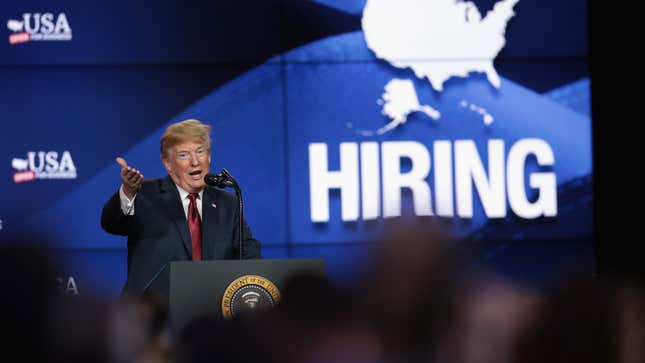
President Trump promised that a Foxconn manufacturing plant would create 13,000 jobs in the state of Wisconsin, even calling it the “eighth wonder of the world.” But the electronics maker never built the factory it had originally pitched to Wisconsin legislators, nor did it hire anywhere close to 13,000 people. Now, Foxconn will not receive billions of dollars in tax subsidies after all.
According to The Verge, contract negotiations between the Taiwanese electronics manufacturer, which makes LCD screens for all sorts of devices, and Wisconsin’s state legislature have fallen through because Foxconn has failed to deliver what it promised in its original contract: a Milwaukee-based U.S. headquarters with a Gen 10.5 LCD factory.
The Wisconsin Economic Development Corporation (WEDC) rejected Foxconn’s application for tax subsidies because it needed to employ at least 520 people by the end of 2019. Foxconn said it had hired 550 people, but the WEDC said only 281 of those employees qualify under the terms of the contract. According to The Verge, some employees out of that 281 could have been deemed ineligible because they made less than $30,000 a year or were not based in Wisconsin.
This Foxconn saga goes back to 2016, when the then-Governor Scott Walker and the majority-Republican state legislature agreed to give the company $3 billion in tax breaks and incentives if its headquarters were based in Milwaukee. In 2018, Foxconn purchased a large office building in the city with enough room for around 500 workers—by all accounts seemed like the company was actually going through with it. But in 2019, Foxconn announced that it wasn’t going to build a factory in Milwaukee after all. The company told Gizmodo that it had changed its plans due to changes within the global market.
From there, the situation became more convoluted. The day after Foxconn decided not to build its factory in Wisconsin, President Trump somehow managed to convince the company to do it anyway.
“After productive discussions between the White House and the company, and after a personal conversation between President Donald J. Trump and Chairman Terry Gou, Foxconn is moving forward with our planned construction of a Gen 6 fab facility,” Foxconn said in a statement to the Milwaukee Business Journal and CNBC. The company’s Gen 6 facility would only made phone screens, instead of the Gen 10.5 facility that was originally planned to manufacture TV screens.
But several obvious signs appeared that the deal was a bad move. By April 2019, not only had the company hired just 178 people out of the 13,000 it was supposed to, but it hadn’t even opened its factory. Gov. Tony Evers had replaced Scott Walker by that point and was set to renegotiate the subsidies deal with Foxconn. By July of 2019, Wisconsin State Assemblyman Gordon Hintz said the company was expected to hire 1,500 instead of 13,000 people—a more realistic number.
And that brings us to where we are today.
Other than not hiring the contractually agreed upon number of employees, the contract between Foxconn and the state of Wisconsin also stipulated that the company build a Gen 10.5 LCD factory, not a Gen 6. That factory was supposed to be 20 million square feet; its Gen 6 building is just 1 million square feet.
Foxconn was also supposed to invest $3.3 billion by the end of 2019 into its factory, per the terms of its contract, but it only invested between $280-300 million. If Foxconn doesn’t maintain at least 5,850 employees by the end of 2023, the WEDC could take back any subsidiary payments the state has already paid out.
Foxconn told the Milwaukee Journal Sentinel it was “surprised” by the state’s decision and that it “threatens good faith negotiations” to revise the contract.